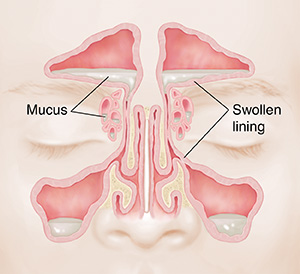Chronic Sinusitis
Chronic sinusitis is a long-term swelling or infection of the sinuses. If it lasts more than 12 weeks (90 days), it's considered chronic.
What is chronic sinusitis?
Sinuses are air-filled spaces in the skull behind the face. They are kept moist and clean by a lining of mucosa. Things such as pollen, smoke, and chemical fumes can bother the mucosa. Constant exposure to irritants can cause ongoing swelling of this lining. It can also harm tiny hair-like cilia that cover the mucosa. Cilia help carry mucus toward the opening of the sinus. Damage to cilia keeps mucus from draining from the sinuses.

Causes of chronic sinusitis
Problems that irritate the mucosa or block drainage can lead to chronic sinusitis. These may include:
-
Infections
-
Chronic allergies
-
Nasal polyps, deviated septum, or other blockages
-
Ongoing exposure to irritants, such as air pollution, cigarette smoke, or fumes
-
Certain autoimmune or inflammatory diseases
-
Acute sinusitis that keeps coming back
Common symptoms of chronic sinusitis
Symptoms may include:
-
Facial pain and pressure
-
Headache and sinus pain
-
Nasal congestion
-
Thick, colored drainage from the nose
-
Thick mucus draining down the back of the throat (postnasal drainage)
-
Loss of smell
-
Fever
-
Cough
-
Sore throat
Diagnosing chronic sinusitis
Your healthcare provider will ask about your symptoms and past health. They will look at your nose and face. You may have imaging studies, such as an X-ray or CT scan of the sinuses. Your provider may also take a sample of the drainage to check for bacteria. You may also have an endoscopy. During this test, the healthcare provider puts a thin tube with a tiny light up your nose to look at your sinuses.
Treating chronic sinusitis
The goal of treatment is to reduce irritation and swelling. Your plan may involve:
-
Taking medicines. Your healthcare provider may give you medicines to reduce the amount of mucus and swelling. These help unblock the sinuses and let them drain. You will need to take antibiotics if you have a bacterial infection.
-
Flushing your sinuses. Your healthcare provider may suggest sinus irrigation. This is flushing your sinuses with saltwater or saline solution. This helps to clear out mucus.
-
Controlling allergies. If you have allergies, work with your provider on a plan to help control them. You may need to take medicines or get allergy shots.
-
Controlling nasal irritants. If you smoke, ask your healthcare provider for help to stop. Check the air quality index every day if you live in an area with a lot of air pollution. Stay indoors on days when the index is high.
-
Having surgery. In some cases, you may need surgery on the nose, sinuses, or both. This can improve sinus drainage or remove nasal blockages.
Online Medical Reviewer:
Ashutosh Kacker MD
Online Medical Reviewer:
Marianne Fraser MSN RN
Online Medical Reviewer:
Melinda Murray Ratini DO
Date Last Reviewed:
3/1/2024
© 2000-2024 The StayWell Company, LLC. All rights reserved. This information is not intended as a substitute for professional medical care. Always follow your healthcare professional's instructions.